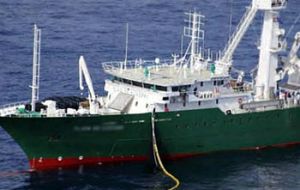MercoPress. South Atlantic News Agency
A hundred Spanish fishing vessels return to Moroccan waters
 There will be a relaxation of the conditions of compulsory capture landing in Moroccan ports, “which will allow better operation of the fleet”
There will be a relaxation of the conditions of compulsory capture landing in Moroccan ports, “which will allow better operation of the fleet” Representatives of the European Union (EU) and Morocco that make up the Joint Committee managed to solve all the practical issues which have been pending since the bilateral fisheries agreement was signed and that prevented the African country from issuing the fishing licenses.
After the result reached in the meeting held last week in Rabat, it is expected that in the coming days the Spanish vessels that requested and paid their licenses at the end of last July can have access to Moroccan waters. Meanwhile, those vessels that did not pay may do so and start fishing in early October.
This fishing protocol will make it possible to carry out the activity of a hundred Spanish vessels in Moroccan waters in exchange for a financial consideration of EUR 40 million annually by the EU.
At the meeting, the parties also agreed to formalize aspects of the sector support mode implementation and of the verification of the socioeconomic impact it will have on the Moroccan population.
In addition, the Joint Commission specified the conditions for taking Moroccan sailors onboard community boats, taking into consideration the characteristics of the tuna and artisanal fishing categories.
Furthermore, it made it clear that there will be a relaxation of the conditions of compulsory capture landing in Moroccan ports, “which will allow better operation of the fleet, without failing to meet the objectives set out in the agreement,” the Spanish Ministry of Agriculture, Food and Environment (MAGRAMA) informed.
These conditions will affect the modes of greatest interest to the fleet of Spain:
Seiners for small pelagic fish; Trawlers; Demersal longline vessels and Tuna bait boats.
Moreover, the EU and Morocco set the terms of reference and guidelines for convening and developing the Scientific Committee, which shall make its first meeting before 15 June, 2015.
The Joint Commission also defined a protocol to ensure the proper use of the EUR 14 million destined for sector support measures and set several outcome indicators and those of impact for each action or project, including its geographic distribution.
For its part, the Spanish Fisheries Confederation (CEPESCA) welcomed the announcement of the return of the Spanish vessels to the waters of the African country.
Pedro Maza, CEPESCA vice-president and president of the Andalusian Federation of Fisheries Associations; Thomas Pacheco, president of the Association of Barbate of Fisheries Entrepreneurs (ABEMPE); and Javier Garat, secretary general of the Confederation were in Rabat.
”It is good news that the negotiations have been completed and have cleared all the doubts we had, especially for categories 1 and 2 (siege of Barbate and bottom longline of Algeciras, Barbate and Conil),“ stressed Garat.
”With regard to category 4 (Galician and Canarian demersal trawl), it is a pity that the Moroccans have not allowed any cephalopod and shellfish by-catch percentage, which may lead us to some unnecessary problems and to jeopardize the profitability of companies,“ added the official.
Besides, Maza stressed that the pact is very important for Spain, and in particular for Andalusia ”because 45 Andalusian fishing vessels can go fishing in Moroccan waters, relieving the situation of the fleet in the Gulf of Cadiz, and generating wealth and employment in ports that are highly dependent on fishing.”
CEPESCA explained what fishing boats and resources may fish under each license:
• Category 1: 20 Spanish artisanal siege ships, especially of Barbate to catch species such as anchovies, sardines and other small pelagic fish;
• Category 2: artisanal bottom longline, mainly from Algeciras, Conil and Barbate, increased by five units, changing from 35 licenses (25 for Spain) of which only four may operate in the south, to 33°25' N latitude. This form is authorized to catch species such as sablefish, sea bream and other demersal species. The boats will have to stop between 15 March and 15 May;
• Category 4: five licenses for trawlers of up to 600 GT in depths that are greater than 200 meters, 70 mm mesh and 11 for bottom longliners of up to GT 150 from 12 miles. These vessels are authorized to fish for sablefish, black hake and halibut. The boats in this category will have to pay EUR 60 per GT per quarter. (FIS).-




Top Comments
Disclaimer & comment rules-

-

-

Read all commentsLooks like the Spanish pirates have just cost the EU another EUR 40 million annually.
Sep 09th, 2014 - 01:25 pm 0More wasted tax.
Good for Morocco and Spain both will come out winning on this deal..good to see Spain is not sitting on its arse but getting out there and doing the hard work and most importantly...EMPLOYING PEOPLE.
Sep 09th, 2014 - 01:33 pm 0Bad Spanish , bad EU , but hey, corruption is alive and well..
Sep 09th, 2014 - 06:40 pm 0Commenting for this story is now closed.
If you have a Facebook account, become a fan and comment on our Facebook Page!